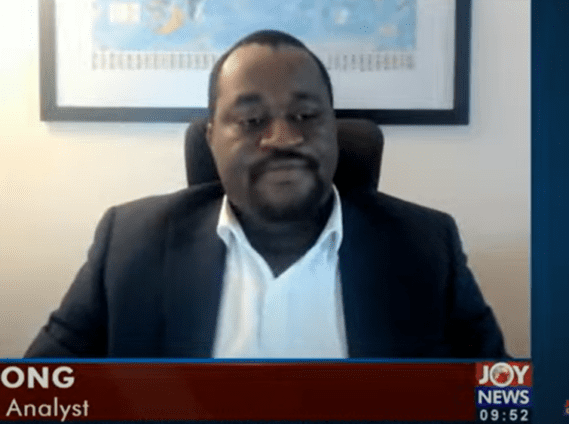An Economist, Theo Acheampong, has decried the introduction of the electronic transaction levy presented in the 2022 budget.
According to the Political Risk Analyst, the electronic transaction levy, also known as the E-levy, is not the best tax decision by government.
He said this was because of the current state of Ghana’s economy, “especially given the time that we are talking about financial inclusion.”
“The evidence base shows even when we implement these taxes, the so-called informal sector in the country are paying a lot in terms of other indirect prices, talk of petrol, talk of fuel prices, talk of general good and services, VAT, National Health Insurance, Tourism levy.
“If you go and eat right now, let’s say you spent about ¢200 to buy a plate of food on that 200, you would have paid VAT, NHIS, Tourism levy you name it cumulatively you are talking between 17 and 20 % and then on top of that you are saying that if I make a transfer, now to pay for that service that I have procured then you are going to take an extra 1.75 % on top of that is where I challenge the bit of the premise,” he stressed.
His assertion comes after the Finance Minister on Wednesday announced the introduction of the levy in the 2022 budget statement to increase tax revenue for the country.
“The government will charge an applicable rate of 1.75% on all electronic transactions covering mobile money payments, bank transfers, merchant payments, and inward remittances, which shall be borne by the sender except inward remittances, which will be borne by the recipient,” Ken Ofori-Atta announced.
Speaking on Joy News’ Newsfile on Saturday, Mr Acheampong called for an exemption in some service of the E-levy tax.
One of the areas he called for the exemption is transfers from bank services to mobile services and vice versa.
He also listed the payment of essential services like water, electricity, medicines, etc. According to him, means should be devised to cover up E-levy charges.
He again called for the reduction of the applicable rate of the E-levy since the 1.75% is too high.
“We should reduce the rate down. I think 1.75% is too high…the rate, in my view, has to come down, possibly 0.5%. Left for me alone, I wouldn’t implement it, but if government wants to go ahead with it, then perhaps we need to look at which services you exclude, the rate and then the trigger point," he said.
Latest Stories
-
Gold Fields Ghana Foundation challenges graduates to maximise benefits of community apprenticeship programme
1 hour -
GBC accuses Deputy Information Minister Sylvester Tetteh of demolishing its bungalow illegally
1 hour -
Boost for education as government commissions 80 projects
2 hours -
NAPO commissions library to honour Atta-Mills’ memory
2 hours -
OmniBSIC Bank champions health and wellness with thriving community walk
2 hours -
Kora Wearables unveils Neo: The Ultimate Smartwatch for Ghana’s tech-savvy and health-conscious users
2 hours -
NDC supports Dampare’s ‘no guns at polling stations’ directive
2 hours -
Police officer interdicted after video of assault goes viral
2 hours -
KNUST’s Prof. Reginald Annan named first African recipient of World Cancer Research Fund
2 hours -
George Twum-Barimah-Adu pledges inclusive cabinet with Minority and Majority leaders
3 hours -
Labourer jailed 5 years for inflicting cutlass wounds on businessman
3 hours -
Parliament urged to fast-track passage of Road Traffic Amendment Bill
3 hours -
Mr Daniel Kofi Asante aka Electrician
3 hours -
Minerals Commission, Solidaridad unveils forum to tackle child labour in mining sector
3 hours -
Election 2024: Engagement with security services productive – NDC
3 hours

